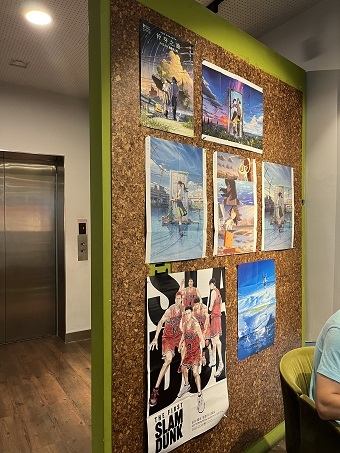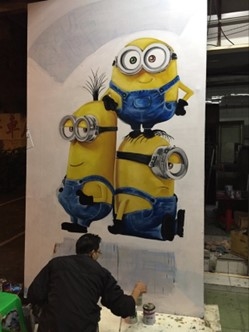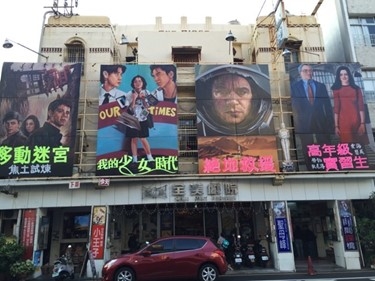Movie Theaters around the World <2>
Okazaki Yuko, freelance writer and editor, contributor
Ways to Enjoy Movies (Part 1)
February 19, 2024
【Special Feature 079】
Special Feature: Movie Theaters around the World (click here for summary)
In Japan, the proper etiquette at movie theaters is to quietly watch the movie until the end. However, in theaters in other countries, that may not be the norm. Movies are a form of entertainment enjoyed around the world, but what kind of theaters do people go to and how do they enjoy watching? Here, we will take a look at some examples of film culture around the world.
Ways to Enjoy Movies (Part 1)
Okazaki Yuko
There are a number of films about movie theaters, including Italy's Cinema Paradiso, America's The Last Picture Show, Taiwan's Goodbye, Dragon Inn, and in recent years, the UK's Empire of Light and India's Last Film Show.
Many fans have a deep sentiment of the space where movies are shown. They often remember movies together with the theater they saw them in. People are often drawn in by landscapes with movies and movie theaters, and it is no exaggeration to say that the space which can be said to be a microcosm, is beloved by local residents, present, past, and future.
Personally, I frequent movie theaters in cities and towns scattered across Japan. In addition, when I go on overseas trips, I frequently spend visiting movie theaters in the town I am in. More recently, multiplexes (cinema complexes) attached to large commercial facilities have become a major presence, but the feel of a theater can change completely depending on the audience.
Recently, there has been a growing trend toward seeing films while vocalizing your feelings, such as "cheering screenings." But in Japan, it is generally considered good manners to watch quietly. Overseas, however, people make a lot of noise such as booing and applauding. It is funny to me to hear people whistling at love scenes - not teenagers, as you might guess, but often elderly men. People talk with each other next to them, phones ring, others look at their phone screens, and loud noises are heard. There is hardly ever an atmosphere of just watching in silence.
While these kinds of lively theater screenings still continue, these days, there are more opportunities to watch movies via streaming. Moreover, the number of moviegoers has plummeted as a result of the COVID-19 pandemic, and theaters now find themselves in dire straits.
In response, upscale movie theaters are sprouting like mushrooms in the US, the UK, and South Korea, providing unique movie experiences that differ from those offered through streaming. In Japan, "109 Cinemas Premium Shinjuku," Japan's first multiplex with all-premium seating, opened on April 14, 2023, attracting a great deal of attention.
Anyway, this preamble has gone on quite long enough. Drawing on stories submitted by the Japan Foundation (JF) overseas offices and my own personal experiences, I would like to introduce to you a diversity of movie theaters and ways of enjoying movies around the world.
1.South Korea
For Korean people, films are a very familiar part of everyday life. There are many small- and medium-sized film festivals held throughout Korea, including the Busan International Film Festival, Jeonju International Film Festival, and the Bucheon International Fantastic Film Festival, and so on. It seems that people go to the film festivals held around the country with the same feeling of going to a music festival.
I have attended the Busan and Bucheon film festivals several times, and while they are being held, the cities are completely dedicated to the events. The downtown areas were all crowded with people involved in the movie industry, and it was not uncommon to see famous actors and directors drinking right next to you.
Movie theaters are one of places families, parents and children, couples, and friends can easily visit together. Instead of going to a movie theater with the intention of watching a particular film, people would often go to the theater first and then pick from what is being shown.
However, in 2022, the average admission fee topped 10,000 won (about 1,030 yen) for the first time. As such, these days, people are said to have changed their attitude about going to see particular films that have fairly good reputations online.
There are very rich emotional expressions by the audience while watching movies. Funny scenes are accompanied by raucous laughter, while shocking scenes might elicit involuntarily gaps of surprise. You often find yourself laughing along with them.
When the main feature was over, it was natural that the lights would come on and everyone would leave right away, even while the credits were still rolling. Recently, however, an increasing number of young viewers have been watching to the very end. This is probably due in large part to the influence of Marvel films, in which the teaser for the new film is shown even after the credits.
On the other hand, those who do not like the dynamic and dizzying unfoldment of Korean and Hollywood films tend to choose even-toned psychological portrayals offered by Japanese films. This year, in particular, The First Slam Dunk and Suzume, two anime works that enjoyed great success in Japan, were very popular. Both have surpassed 4 million viewers, and sales of related merchandise seem to be going well.
Perhaps because many people go to the movies, Seoul and other cities are home not just to large multiplexes, but also a large number of mini-theaters. Each has its own unique features, such as floor seating or an attached café and bookstore, and they are known for their cozy atmospheres. They include silver theaters for the elderly and mini-theaters operated within universities.
I was surprised by the services of "Cine de Chef," an upscale movie theater in Busan, operated by cinema giant CGV, which includes full-motion beds for every seat, allowing you to watch the movie lying down on the bed.
Outdoor screening events held on rooftops, parking lots, and beaches have been well-received, with drinks and food provided. There are also a growing number of screenings based on an array of different concepts. Korea's movie-going environment seems like it will continue diversifying in the years to come.
2.China
In China, with its strict regulations on imports, there are few opportunities to watch foreign films. Statistics for 2021 show that 62 new films were imported, or 67 if old films are included, making up only 12% of the total. I hear that imports used to be about 30%, but the situation seems unlikely to change.
This year, there were a number of Japanese films screened, notably The First Slam Dunk, which had a screening event held at midnight on the first day of its release in Peking University's Centennial Memorial Hall. The enthusiasm was quite something to behold. There was a huge 27-meter-high screen, and the first through the third floors were filled with the audience, who watched the movie as if it were an actual basketball game.
The same Centennial Memorial Hall also hosted a screening of Suzume. The abandoned park from the film's opening scene was recreated on stage, and the director Shinkai Makoto appeared from that famous door. The staging grabbed headlines.
 Posters for the hugely popular The First Slam Dunk and Suzume
Posters for the hugely popular The First Slam Dunk and Suzume
In China, foreign films are generally screened as edited versions, but screenings at international film festivals are very popular among film fans because they provide the opportunity to see foreign titles in a form close to the original. Lists of films and screening locations are shared among fans on social media, and tickets are bought up in droves.
As in Japan, cinema complexes attached to large department stores and shopping malls are by far the most common type of movie theater, but independently operated mini-theaters are also highly popular among young movie fans.
For example, Shanghai's "Cathay Theatre," which has been in business since the prewar period, is a long-established mini-theater with a retro Art Deco-style exterior and was selected as a piece of outstanding historical architecture.
Meanwhile, the "Orange Club Cinema" in Beijing is a modern movie theater that also operates as an actual nightclub. With an interior design reminiscent of an upscale club, customers can relax on the sofas while watching movies, and the staff will bring food and drinks on order.
Recently, more people are concentrating on watching the movies, but at multiplexes, many people react vocally. I saw audience members talking to each other, looking at their phones, and even talking on the phone during the film. When Home Sweet Home, a suspense film directed by Saitoh Takumi, premiered at this year's Shanghai International Film Festival, there were repeated rings from cell phones, which broke the tension and drew laughter from the audience. Saitoh remarked that "I thought that the audience members were enjoying an extraordinary film including that."
When the credits roll, the lights come on and most people get out of their seats. To top it off, the staff come in and start cleaning up, so only two or three people remain seated to the end. In a sense, it may be the norm in China to leave as soon as the credits start.
3.Taiwan
Unlike Korea and China, Taiwan has a larger proportion of foreign films than domestic films. Taiwanese films accounted for 6.9% of the 10.191 billion TWD (about 40 billion yen) of box office revenue in 2019, and 24.6% of the 4.964 billion TWD (about 22 billion yen) in 2021.
As of 2022, there are 112 movie theaters and 933 screens in Taiwan. In addition to multiplexes and mini-theaters. There is also the "Taipei Film House" operated by the Taipei City Government, "SPOT-Huashan" operated with subsidies from the Ministry of Culture, and the TFAI, the equivalent of Japan's National Film Archive. The fact indicates that the entire country is putting all its energy into promoting the movie business.
Actually, people in Taipei told me that they had fond memories of receiving free tickets from the city's movie theaters before the summer and winter vacations when they were in elementary school. Recently, in an effort to boost the entertainment industry, which took a hit from the COVID-19 pandemic, the Taiwanese government issued "culture points" (1,200 TWD, equivalent to 5,400 yen) for young people under the age of 18 to use for one year at movie theaters, theaters, bookstores, etc. I quite envy the idea of a "youth and culture" support program, an idea that would never come up in Japan.
The only complaint I have is seat selection. In Japan, you can choose your seat from a seating chart, but in Taiwan, if you don't specifically ask, your seat will be assigned arbitrarily, and for no special reason, you will often find yourself sitting next to someone in a theater full of empty seats. Perhaps for this reason, more and more people are now making reservations online, where they can choose their own seats.
A particularly memorable place for me personally is the retro-style "Shengping Theater" in Jiufen, a famous tourist spot. Established in 1914, it moved to its current location in 1934. The current building was renovated in 1962.
Jiufen was once a prosperous mining town, but with the decline of the mining business, the Shengping Theater was closed in 1986. In 1989, however, Hou Hsiao-hsien's A City of Sadness which was shot on location in Jiufen, won the Grand Prix at the Venice International Film Festival, and Jiufen once again came into the spotlight. Another major factor was the attention it garnered as the town that inspired Spirited Away.
After renovation, the theater eventually reopened in 2011. The theater plays documentary films on the history of Jiufen in the morning and classic movies in the afternoon. Free admission is also an attractive point. Today, the theater has the atmosphere of a museum, featuring a display of old movie projectors and posters.
Meanwhile, in Tainan, the retro "Chuan Mei Theater," which opened in 1950, is popular among movie fans, and it is also known to have been frequented by the director Ang Lee. Across the street, a craftsman creates hand-painted signs, and you can enjoy observing him at work. Paying little attention to the onlookers, he continues his work in silence. The exterior of the Chuan Mei Theater, with the finished hand-painted signboard facing the street, also evokes a feeling of nostalgia.
 A craftsman making hand-painted movie signboards, something rarely seen in Japan today
A craftsman making hand-painted movie signboards, something rarely seen in Japan today Main entrance to the Chuan Mei Theater in downtown Tainan
Main entrance to the Chuan Mei Theater in downtown Tainan4.Malaysia
For Malaysians, movies are a mainstay of entertainment. Large shopping malls usually contain cinema complexes, crowded with many people.
In particular, action, horror, and other genre films are very popular. In addition to about 60 domestic films released annually, a variety of Hollywood, Hong Kong, Taiwanese, Tamil, Thai, and Indonesian films are also shown. Commercially successful Japanese films are mostly anime, which usually have fan screenings prior to their release. Occasionally, tickets that come with free novelty items are sold for about 10 times the face value. This support from hardcore fans is truly astonishing.
The official language of Malaysia is Malay, with English as a semi-official language, and other languages including Chinese and Tamil are also used. For this reason, foreign films are often subtitled in two or more languages. For Japanese films, subtitles in three languages (English, Malay, and Chinese) occupy the bottom third of the screen. Although this is regrettable for the fans, ultimately, the desire to be among the first to see a new film probably prevails.
In addition, since different ethnic groups speak different languages, the lineup of movies, even at major multiplexes, varies considerably depending on the location and the ethnic groups that reside nearby.
Another aspect of movies in Malaysia is the strict censorship. Depictions of sex, extreme violence, criticism of the government, and anything considered disruptive to the national order are required to be cut, and portrayals of LGBTQ issues are also prohibited on Islamic grounds.
5.Thailand
In Thailand, as in Malaysia, movies are a popular form of entertainment. Cinema complexes operated by Major Cineplex, the largest theater chain in Thailand, are usually located in large shopping malls, and are crowded with people enjoying movies when they go shopping.
What is unique about Thailand is long trailers before the main feature begins. They run for 20 to 30 minutes, so there is no problem at all if you arrive after the scheduled start time. Not only that, but the royal anthem is always played before the start of a film, like a formal ceremony.
The films shown include not only domestic films, but also films from Hollywood, Korea, and Japan, giving a rich international flavor to the lineup. Among Japanese films, anime titles stand out. Popular titles such as Detective Conan are released in Thailand within a week or so after their Japanese release.
One of the most famous movie theaters is the "Paragon Cineplex," a luxury cinema complex in Bangkok. The ceilings are decorated with chandeliers, and luxurious-looking sofas are arranged in the theater. The 14 screens include the super-luxury VIP screen called, "Honda Ultimate Screen," a VIP room based on the concept of "an ultimate experience beyond imagination." Tickets are priced at 2,200 baht (8,000 yen!) per pair of seats. Visitors also enjoy access to a spa, a stylish bar, and other extravagant services that one would not expect to find in a regular movie theater.
On the other hand, the "Scala Cinema," a longtime favorite in Bangkok, regrettably closed in July 2020, bringing the curtain down after 51 years of operation that began on December 31, 1969. With its Art Deco-style interior decorations, the theater had many fans, and photo exhibitions and other events are held there, even after the demolition of the building.
Meanwhile, in rural areas of Thailand, screens are set up inside temple grounds, and events are held where people can watch the films while eating food from street stalls.
6.Cambodia
Since there is little entertainment available in Cambodia, movies are one of the most popular leisure activities for young people. However, there are still only a handful of movie theaters in the country, so in areas without them, Japanese NPOs and other organizations engage in activities in the form of "mobile movie theaters," loading projection equipment onto trucks and visiting rural communities.
Popular films are horror films that can be enjoyed like a theme park attraction. While it is possible to watch both Cambodian and foreign films, it is difficult to watch new foreign films around the same time as their global release. On the flip side, admission is cheap, and so, you can enjoy a film for only two to five dollars. Another key point to watch for is that the national anthem is played before the main feature, and everyone is required to stand throughout without fail.
There are many cases in which foreign films are dubbed in Khmer, but it is interesting to note that there are many films in which almost only the same person dubs all the voices throughout. It might be a bit of a letdown to watch an action film with no variation in expression, but if you can accept this, you can probably enjoy the film.
Continued in "Ways to Enjoy Movies" (Part 2)
Related Articles
Back Issues
- 2024.11. 1 Placed together, we …
- 2024.5.24 The 50th Japan Found…
- 2024.5.24 The 50th Japan Found…
- 2024.5. 2 People-to-People Exc…
- 2024.2.19 Movie Theaters aroun…
- 2024.2.19 Movie Theaters aroun…
- 2023.4.24 The 49th Japan Found…
- 2022.10.24 Inner Diversity <2> …
- 2022.10. 5 Living Together with…
- 2022.6.13 The 48th Japan Found…


